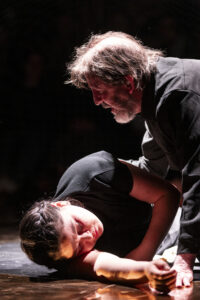The Neilson Nutshell, June 20
4/10
There is no greater play than King Lear. None is more disturbing, nor more moving, and no other Shakespeare work possesses so many characters of note. No role approaches the emotional breadth and height of Lear, nor his apocalyptic and hallucinogenic imagery. Even Othello is not as tormented as Lear, who dies in an ecstasy of grief, the wonder being that he survives until the final scene.

Even more than Macbeth, this is a pagan play, set in an Ancient Britain forsaken by the gods, because parents and children chew through their sacred bonds and spit them out. After three hours of devotional love, rabid lust, pure evil and unendurable torment, you should walk out dazed, shaken, drained and peculiarly exhalant. Instead you leave rather pleased it’s over.
Alas, when this ultimate masterpiece arches up towards its many moments of heartbreak and immortality, director Peter Evans’ new Bell Shakespeare production too often shrinks to the school hall: to actors speaking lines whose import they barely seem to grasp.
Evans uses the tight little Nielson Nutshell, the audience on four sides of an oblong stage, and some lines are lost when the actors face away, with Shameer Birges (Albany) and Michael Wahr (Cornwall) easily having the best projection, and a command of the language to match. The upside of being in the round is proximity to the action, which is mighty when fight director Nigel Poulton choreographs such alarmingly real swordplay in the duel between Edmund (Darius Williams) and Edgar (Alex King) as has you wincing at each thrust.

Another aspect of being in the round is the absence of a set, and consequent focus on unadorned performance. Yet designer Anna Tregloan has maximised the scant potential, her theme a mix of gold, brass and copper surfaces, from the floor to celestial hoops above, hanging panels, and shimmering discs that could be stars or pagan symbols. Her costumes, by contrast, have the actors resembling waiters, and looking awkward when they don robes to herald the past.
Robert Menzies gives us a hyperactive Lear, with little variation in the cadences of his delivery of some of the greatest lines ever penned. If he rises to foaming anger, there’s none of the hopeless meekness of desolation. In Act IV, when he enters “bedecked with weeds”, Menzies catches the humour, but misses the pathos. Then when he encounters Cordelia soon after, Menzies finally softens his tone and softens our hearts, accordingly – but he does not break them. Nor does he break them in the storm scene, or at the end, when Cordelia is dead. The world does not crack open like it should.
Countless pearls are buried throughout, as when, following Gloucester’s eyes being put out, Regan (Tamara Lee Bailey) delivers the supernaturally cruel, “Let him smell his way to Dover”, but says it walking off; doesn’t even emphasise the “smell”.

Melissa Kahraman is a better Fool than she is a Cordelia, making the zany jokes work, even if she rushes some of the equally zany wisdom. Williams gradually becomes more convincing as Edmund, the charismatic nihilist, without ever persuading us that Regan and Goneril (Lizzie Schebesta) would be quite so desperate to bed him. King rises to an adequate Edgar by the end, and James Lugton (Gloucester) at least means what he says, even if he, too, fails to impale us on his torment. Thankfully Max Lyandvert’s eerie music is there to aid the cause, but, 14 years after Bell Shakespeare last attempted Lear, one might have hoped for more.
Until July 20.